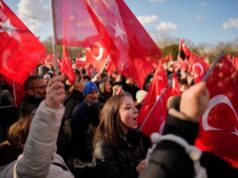India on Thursday highlighted human rights violations by Pakistan at the United Nations Human Rights Council (UNHRC).
India’s response came after Pakistan raised the issue of human rights violations in Jammu and Kashmir.
Mini Devi Kumam, Second Secretary, India’s Permanent Mission at UNHRC, said it had become a habit of Pakistan to misuse the UNHRC platform to make misleading references about internal matters pertaining to Jammu and Kashmir.
“This Council should be mindful that the dubious concern for human rights is coming from a country, which has systematically abused and violated the human rights of the people in Baluchistan, Sindh, Khyber Pakhtunkhwa as well as Pakistan Occupied Kashmir,” Kumam said at the 37th Session of UNHRC.
She added that “Pakistan has long been attempting to mask its territorial ambitions and use of terrorism as a state policy under the guise of concern for human rights”.
The Indian representative also told the UNHRC that Pakistan was committing grossest violation of human rights by exporting terrorism to Jammu and Kashmir.
“Terrorism is the grossest violation of human rights. The real problem in the State of Jammu and Kashmir is terrorism, which has constantly received sustenance from Pakistan and territories under its control,” Kumam asserted.
India also urged the UNHRC to call on Pakistan to end cross border infiltration, to dismantle special terrorist zones, safe havens and sanctuaries, and to take verifiable actions, including on terror financing.
The Indian representative also told the UNHRC that Pakistan should provide freedom to the people of Pakistan occupied Kashmir by ending its illegal and forcible occupation.
“We urge the Council to call on Pakistan to stop targeting political dissidents and legitimate criticism in Sindh, Baluchistan and Khyber Pakhtunkhwa and to stop torture, enforced disappearances and unlawful killing, including that of journalists and activists by its security agencies. Pakistan should also prosecute all perpetrators of such crimes,” Kumam said.
India also demanded end of sectarian violence, systemic persecution and attacks on Muslim minorities, such as Shia, Ahmadiyas , Ismailia and Hazaras in Pakistan.
INDIA HAD SHOWN MIRROR TO PAKISTAN EARLIER TOO.
Earlier,Pakistan’s permanent representative to the United Nations (UN) Maleeha Lodhi, had, in September 2017, shown pictures of a girl injured by pellets at the UN General Assembly. Exercising Inidia’s right to reply, Paulomi Tripathi, India’s young diplomat pointed out that the image Lodhi used for accusing India of violating human rights was in fact that of a Palestinian woman.
Tripathi further elaborated that the woman in the photograph was Rawya abu Jom’a, from Palestine and that the image was taken on 22 July 2014 by an American photographer Heidi Levine. The image was published by The New York Times on 24 March 2015 under the caption “Conflict, Courage and Healing in Gaza”.
Tripathi also elaborated to the President of the UN that “in view of this cynical and misleading attempt by Pakistan, we are constrained to show this assembly a photograph that reflects the real picture of pain inflicted by the nefarious design of Pakistan on India.” Tripathi showed the Assembly a picture of 22-year-old Lt. Umar Fayaz, hailing from Jammu & Kashmir, who was kidnapped from a wedding celebration. “He was brutally tortured and was killed by Pakistan-supported terrorists in May 2017.
Before Paulomi Tripathi,India fielded young diplomat Eenam Gambhir to deliver a stinging response to Pakistan Prime Minister Shahid Khaqan Abbasi’s speech at the UN General Assembly, describing the neighbouring country as “Terroristan” with a flourishing industry that exports jihadis worldwide.
Gambhir is not new to the role – a year ago, she had given an equally scathing reply to then prime minister Nawaz Sharif’s address to the General Assembly, in which he raked up the Kashmir issue and held up slain militant commander Burhan Wani as a leader of a “peaceful freedom movement”.
India’s response, under the “right of reply” during the debate at the General Assembly, played on the word Pakistan, which means “land of the pure”, and said the country had become the “land of pure terror”.
“In its short history, Pakistan has become a geography synonymous with terror…Pakistan is now ‘Terroristan’, with a flourishing industry producing and exporting global terrorism,” said Gambhir, a first secretary in India’s permanent mission to the UN.




